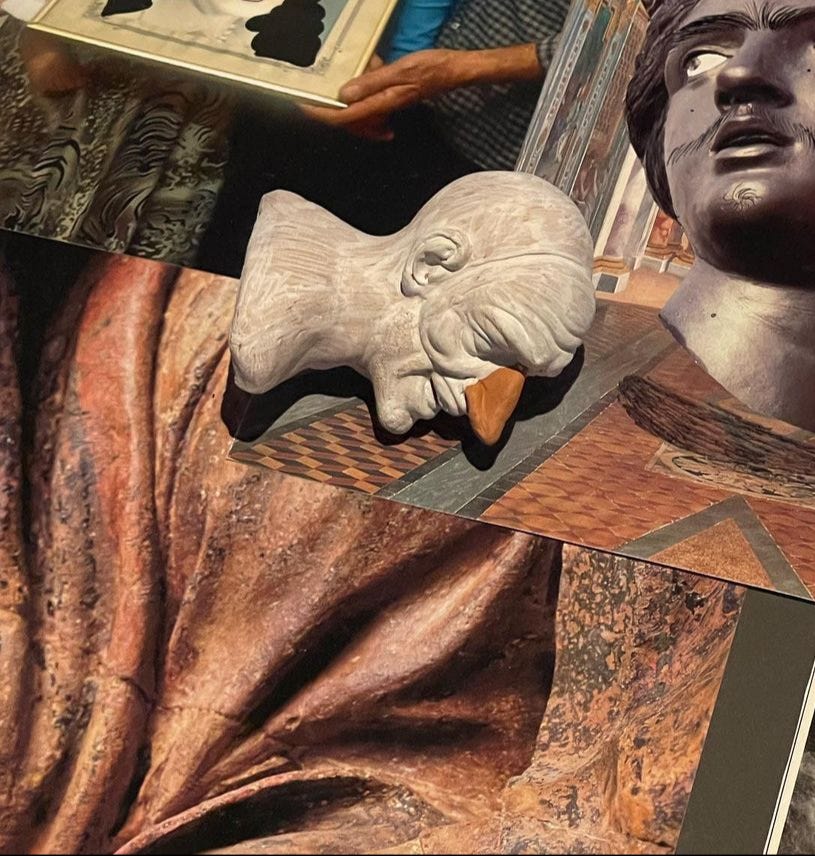THE CIA'S FOUCAULDIAN DREAM
“MAYBE THE TARGET NOWADAYS IS NOT TO DISCOVER WHAT WE ARE, BUT TO REFUSE WHAT WE ARE,” WRITES FOUCAULT. BUT BOTH CAN BE A DENIAL OF OUR LACK.
Is Foucault being read as nothing matters, anything goes?
If the CIA approved of Foucault, it could have been from a sense that capitalist unhappiness needs an anything goes to ease its irrational guilt over never being happy enough.
Anti-Marxists ‘provide the perfect model for constructing deceptive narratives that amalgamate purported personal political growth with the progressive march of time,’ Gabriel Rockhill writes.
‘as if both individual life and history were simply a matter of ‘growing up’ and recognizing that profound egalitarian social transformation is a thing of the—personal and historical—past,’ writes Rockhill.
Denying lack is part of Foucault’s appeal.
Foucault’s offering of not being limited to what we are, of refusing what we are, denies lack while seemingly embracing lack.
TRYING TO DISCOVER WHAT WE ARE CAN BE A DENIAL OF OUR LACK. BUT REFUSING WHAT WE ARE CAN BE DENIAL OF OUR LACK TOO WHEN THIS POSITS FULLNESS AND LIMITLESS FREEDOM.
Disavowing lack seeks the wrong kind of authenticity.
‘I strive only to know my nothingness,’ writes Blaise Pascal in an attempt to not disavow lack.
As capitalist subjects we aesthetizice lack into a vague yearning for nothingness, for silence.
Unable to escape being capitalist subjects, we want to shut out the voices within us:
‘I wanted to escape the unrest, to shut out the voices around me and within me, so I write,’ writes Kafka.
What frees us is to see, in McGowan’s words, ‘we are not really pursuing pleasure’.
What we really pursue is in some way uourselves.
We just have to become the little blessed small wonder that we already are.
We already are doing the magic we were looking for.
We can be ‘satisfied with the satisfaction that is already ours,’ writes Todd McGowan.
Not disavowing lack allows us to see in our very lack our force.
Staging what we are helps us know ourselves better.
We can become what we are: our own lack & from it our own cause.
We sometimes need the excuse of a fiction to stage what we truly are.
Not staging simply strength but allowing for how we are always staging allows us to feel less staging.
‘I write in order to have no face. Do not ask who I am and do not ask me to remain the same,’ writes Foucault.
Isn’t Foucault popularizing a way to excuse oneself?
Disavowal of lack stands in the way of turning to active mourning.
Desire for authenticity is an inability to grow on lack into being more able to mourn.
When we mourn we mourn also what we were for the one we lost.
In this case the one we lost is the version of us when we still believed in fullness.
We mourn who we can never be if lack is a truth and not fullness.
We fear breaking the mirror rather than celebrating our release from its grasp - or is this wisdom another lure of searching for an authenticity without lack?
Is our embrace of lack always overshadowed by a stronger desire to be nonlacking?
Is accepting that we disavow lack the way to fight for any movement for equal rights for all?
ADDENDUM:
Excerpts from Rockhill’s text:
‘The intelligence agency understands culture and theory to be crucial weapons in the overall arsenal it deploys to perpetuate US interests around the world’ writes Rockhill.
‘The recently released research paper from 1985, entitled “France: Defection of the Leftist Intellectuals,” examines—undoubtedly in order to manipulate—the French intelligentsia and its fundamental role in shaping the trends that generate political policy,’ writes Rockhill.
‘Suggesting that there has been a relative ideological balance between the left and the right in the history of the French intellectual world, the report highlights the monopoly of the left in the immediate postwar era—to which, we know, the Agency was rabidly opposed—due to the Communists’ key role in resisting fascism and ultimately winning the war against it,’ writes Rockhill.
‘The Parisian central intelligentsia squadron was collecting data on how the theoretical world’s drift to the right directly benefitted US foreign policy,’ writes Rockhill.
‘The left-leaning intellectuals of the immediate postwar era had been openly critical of US imperialism,’ writes Rockhill.
‘Jean-Paul Sartre’s media clout as an outspoken Marxist critic, and his notable role—as the founder of Libération—in blowing the cover of the CIA station officer in Paris and dozens of undercover operatives, was closely monitored by the Agency and considered a very serious problem,’ writes Rockhill.
The CIA has ‘been keen on understanding and transforming institutions of cultural production and distribution,’ writes Rockhill.
‘the masked mandarins commend and support the relentless critique that a new generation of anti-Marxist thinkers …unleashed on ‘the last clique of Communist savants’ (composed, according to the anonymous agents, of Sartre, Barthes, Lacan and Louis Althusser),’ writes Rockhill.
‘‘critical demolition of Marxist influence in the social sciences.’ Foucault, who is referred to as “France’s most profound and influential thinker,’ is specifically applauded for his praise of the New Right intellectuals,’ writes Rockhill.
REFERENCES
https://thephilosophicalsalon.com/the-cia-reads-french-theory-on-the-intellectual-labor-of-dismantling-the-cultural-left/
Art: instagram.com/moshtariii





capitalist unhappiness needs an "anything goes" to ease its irrational guilt over never being happy enough.